Key Takeaways
- Digital marketing improves brand visibility and customer engagement by using online channels to reach customers where they are most active.
- Today, an impactful digital property is imperative for all types of businesses, using their websites and social media channels as the foundation for digital marketing efforts.
- Powerful digital marketing strategies incorporate data analytics to continually adjust campaigns and create better customer experiences on every platform.
- With digital marketing, it’s cheaper, so any size business can see a return on investment that’s going to be pretty significant for a small investment.
- Combined with the power to connect with large global audiences or drill down to hyper-specific geographic locations, the potential to supercharge your marketing efforts is incredible.
- Digital marketing personalization strengthens customer relations by using customer data to create more meaningful experiences and increase customer loyalty.
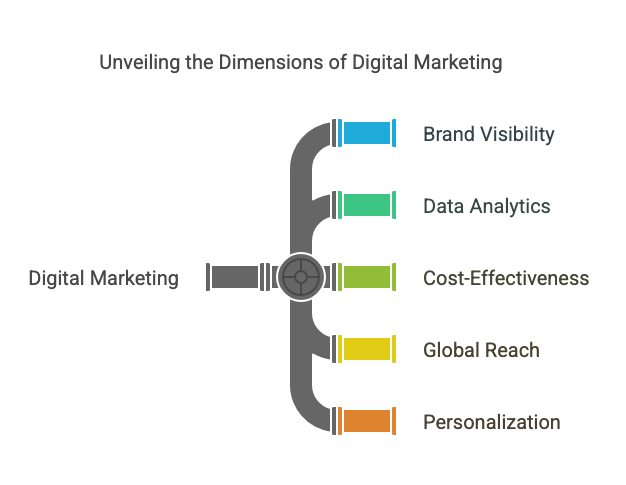
Digital marketing is an essential component of today’s business environment, providing companies with powerful new tools to reach and engage their customers. It uses digital channels to promote products or services, allowing for more targeted outreach, brand awareness, and improved customer interaction.
With tools like social media, email campaigns, and SEO, businesses can tailor their strategies to meet specific goals and audiences. By prioritizing accessibility and relatability, digital marketing enables businesses to create authentic connections that nurture long-term relationships.
Whether it’s a small startup or a multinational corporation, embracing digital marketing strategies allows businesses to remain competitive and relevant in an increasingly fast-paced world. By focusing on delivering real value and practical insights, we can navigate this dynamic field effectively and achieve sustainable growth.
What is Digital Marketing?
Definition of Digital Marketing
Digital marketing simply refers to the practice of leveraging online platforms to reach potential customers. It combines various strategies and mediums, such as creating a website and social media marketing, to develop a strong digital footprint.
In today’s world, this is especially important for businesses looking to remain competitive. Websites are now digital storefronts, and social media platforms like Facebook and Instagram allow brands to connect with users in a more organic way.
Dr. Dave Chaffey describes digital marketing as a three-stage approach: Opportunity, Strategy, and Action. This approach allows companies to better strategize and implement their campaigns.
How Digital Marketing Works
Connecting with customers means having smart online advertising campaigns. These campaigns leverage customer data analytics to optimize campaigns with laser-like efficiency to meet exact customer demands.
Connecting with customers in a two-way manner on multiple platforms is critical. For instance, brands can take advantage of their email newsletters to provide a behind-the-scenes look, keeping customers engaged and excited.
Digital channels allow companies to collect information about their audiences’ demographics, such as age and geographic location, to further tailor interactions.
Categories of Digital Channels
| Channel | Effectiveness in Reaching Audiences |
| Social Media | High |
| High | |
| Search Engines | Medium |
New channels, such as voice search, are on the rise. As digital marketing continues to grow and adapt alongside the digital age, it is a strategy that requires little initial investment.
It’s a lot more cost-effective, with digital leads being 61% less expensive than other lead generation methods. Since there are more than 14 billion mobile devices around the world, this ability to reach mobile users is a major benefit.
Benefits of Digital Marketing
Digital marketing is unique in its numerous benefits. It improves brand awareness and increases customer engagement. Through digital marketing mediums, such as social media, businesses can reach audiences around the world.
Coca-Cola’s “Share a Coke” campaign is a great example. By making bottles personal with people’s names, it created a worldwide phenomenon! This sort of strategy provides real-time engagement metrics, giving you insight into how effectively you’re reaching your target audience.
Cost-Effectiveness of Strategies
Digital marketing is the most efficient and affordable marketing option available—particularly for small businesses. It requires the least amount of upfront costs, providing the highest returns on investment when compared to traditional avenues.
Tools like Google Analytics help track performance, letting businesses optimize budgets efficiently. This strategy levels the playing field for little guys to compete dynamically with big guys.
Geographic Reach Advantages
Digital marketing removes physical boundaries, allowing businesses to reach potential customers worldwide. They can target their campaigns to just the areas they operate in, increasing relevancy and reach.
A prime example is Airbnb, which grew their user base internationally by employing savvy, targeted digital strategies.
Personalization and Engagement
Digital marketing is unmatched when it comes to personalization. Using data to inform decisions, businesses can create personalized experiences that cater to each consumer’s unique preferences.
This personal touch enhances customer loyalty, as 90% of US consumers consider personalized content a motivator to do business with a brand.
Conversion and Convenience
Digital marketing makes your customer journey easy and convenient, which is an important driver of behavior. Online shopping is just one case where smart digital marketing strategies can make a huge difference in conversion rates.
The best teams are always looking at performance in real time, making sure every strategy is consistently and constantly optimized.
Crafting a Digital Strategy
Creating a digital marketing strategy requires multiple steps that align and interconnect to fuel success. First, it’s important to set the right SMART objectives. These goals are very clear and measurable.
For instance, you could set the goal of boosting web traffic by 15% in three months through the use of targeted advertising. Specific goals give your strategy focus and make it easier to monitor success.
Attracting the right people is key. Understanding their interests and needs allows you to customize your engagement strategy. Surveys, social media analytics, and other feedback mechanisms can help inform this step.
Customer personas, or profiles of your ideal customers, are invaluable in creating strategies that resonate.
Proper budgeting across all channels helps prevent wasted spending. Focus on channel costs, estimated reach, and ROI. Given that budget decisions have such a direct impact on marketing success, they should be a carefully considered and planned decision.
Choosing appropriate channels involves evaluating each one’s strengths and weaknesses. For instance, social media is great for engagement, while email is ideal for direct communication.
Aligning these choices with audience preferences maximizes impact.
Measuring and optimizing marketing efforts through continuous improvement is essential. Continuously reviewing campaign performance and adjusting them in real-time helps ensure strategies are always working at their best.
Techniques such as A/B testing can begin to quantify what is most effective. Since digital marketing is ever-changing, a test-and-learn approach is key.
Regular evaluations, at a minimum quarterly and up to annually with an in-depth annual review, ensure that strategies stay focused.
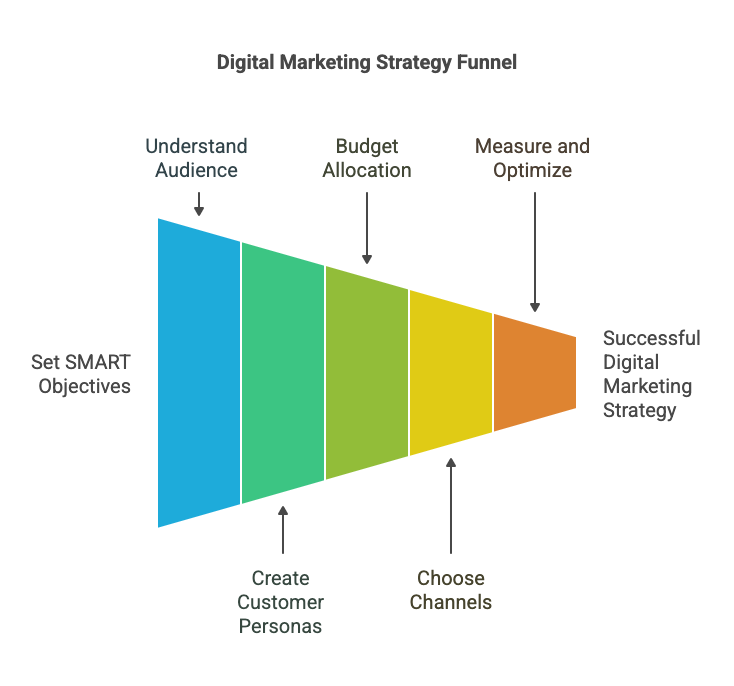
Role of a Digital Marketer
1. Key Responsibilities Overview
Digital marketers are responsible for all tasks that increase brand awareness and potential leads via digital platforms. They write and refresh website content, respond to comments and questions on social media, and run targeted advertising campaigns to increase a company’s visibility online.
While creativity is extremely important in executing successful marketing campaigns, strategic planning is even more critical. That means working with stakeholders to define success and identify key performance indicators to measure progress.
Continuing education is essential, since the digital marketing field is constantly changing, forcing marketers to learn and improve skills on a regular basis.
2. Content Management Duties
Effective content management is key to a successful digital marketing campaign. Smart marketers develop meaningful content that engages their target audience on a deeper level.
They use tools such as CMS to plan posts in advance and monitor their outcomes.
3. SEO and SEM Tasks
SEO and SEM responsibilities consist of on-page content optimization and paid search campaign management to drive organic and paid search visibility.
These practices are familiar to all marketers, targeting keywords and leveraging analytics to increase search rankings.
4. Social Media Management Roles
Social media management requires an understanding of the unique voice and culture of each platform.
Platforms such as Hootsuite help marketers schedule posts and analyze social media metrics.
5. Email Marketing Responsibilities
Email marketing tasks include building segmented and personalized campaigns.
Key metrics like open and conversion rate determine success.
6. Data Analysis and Reporting
This is where data analysis plays a key role in becoming a digital marketer.
Reporting on KPIs through tools such as Google Analytics puts data in a digestible format, making sure every decision you make propels your business forward.
Essential Skills for Digital Marketers
Digital marketing is an ever-evolving industry that takes a combination of technical expertise and creativity to thrive. With every passing year, the digital landscape continues to shift and change, creating new opportunities and challenges for marketers.
Hard Skills Required
In fact, the technical skills are the true backbone of digital marketing. You need to be good at SEO and analytics. These skills are essential particularly because they help drive more quality traffic to your online properties, namely your landing pages.
Understanding how to use SEO and SEM tools such as Ahrefs, Moz, and SEMrush to their maximum potential is critical. Familiarity with coding fundamentals helps to inform and improve digital strategies through a deeper understanding of customization and optimization opportunities.
Expertise in conversion rate optimization (CRO) is key for translating data into actionable insights.
Soft Skills Needed
That’s where interpersonal skills come in – they’re critical to digital marketing success. Collaboration and communication with each other and the team at the agency are critical to keeping campaigns running smoothly.
Problem-solving skills help navigate challenges, while an insatiable curiosity for industry changes keeps marketers ahead. An in-depth knowledge of social media platforms makes sure that content is being seen by the right audience, increasing engagement and ROI.
Tools for Digital Marketers
Digital marketing is all about using the right tools smartly to save time & resource while maximizing results. These tools can include everything from analytics platforms to automation systems, with each fulfilling a specific function.
For example, Hotjar provides a visual, real-time snapshot of visitor actions on your website, so marketers can discern how users are interacting with your site. Google Analytics, a major player in this field, can be configured to measure site performance, keyword contribution, and user path through your site.
Tools like Audiense take social media strategy a step further by allowing marketers to segment their audiences to create more targeted, effective campaigns.
Here’s a quick rundown of popular digital marketing tools categorized by function:
- Analytics: Google Analytics, Hotjar
- Social Media: Audiense, Hootsuite
- SEO: SEMrush, Moz
- Content Management: WordPress, HubSpot
- Email Marketing: Mailchimp, Constant Contact
Automation tools have unlocked new levels of marketing efficiency by providing codeless campaigns, easy automations and clear, impactful reporting.
Keeping up with these new tools and trends ensure that your confidence remains high as you explore the ever-changing digital landscape.
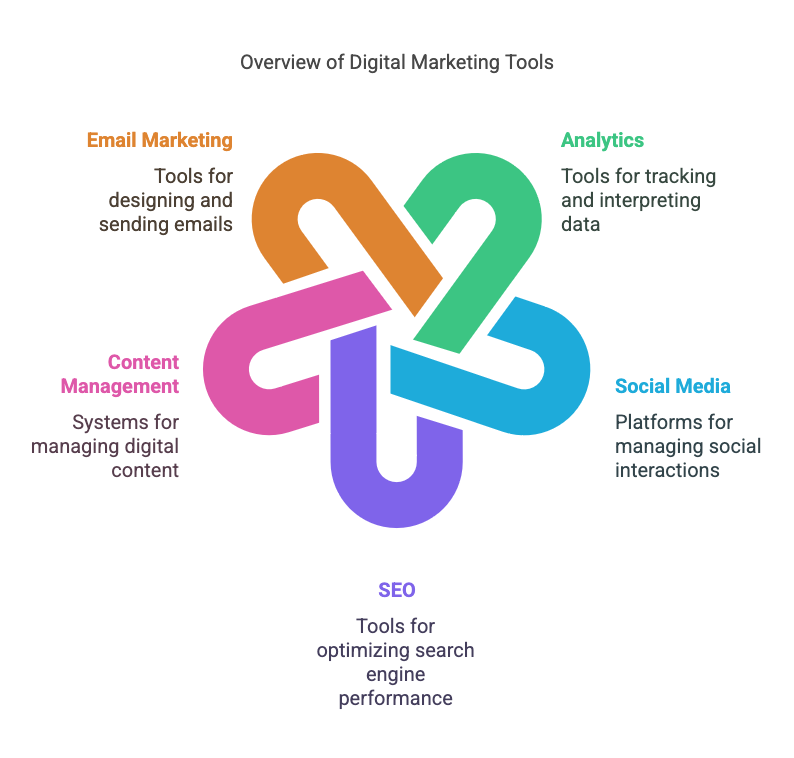
Major Challenges in Digital Marketing
In the ever-changing landscape of digital marketing, being one step ahead is essential. Marketers often grapple with challenges like keeping up with rapid technological advances, maintaining brand visibility amidst changing algorithms, and predicting user behavior. These obstacles can tax resources as businesses scramble to meet competing demands of time and budget.
The dating and personals industry is consistently one of the top converters, with impressive rates above 9 percent. They do this by expertly marrying creativity with analytics. On average, across all industries, the average conversion rate in Google AdWords is only 3.75 percent. This disparity further emphasizes the need for impactful, creative strategies rooted in strong data insights.
Staying Updated with Trends
Staying up-to-speed with the latest trends in the industry is essential to success. Marketers need to take advantage of tools such as online discussions, virtual classroom webinars, and new media industry reporting to stay educated. Networking with your fellow peers is one of the most valuable ways to share insights.
Attending conferences doesn’t just keep you on top of new trends and best practices.
Balancing Creativity and Analytics
That creative flair, paired with data-driven decision-making, is what makes campaigns successful. The best case studies—like Nike’s highly effective personalized ads—prove that creativity and analytics go together like peanut butter and jelly.
Creating a culture that embraces creativity paired with the right analytical tools allows marketers to develop unique, data-driven campaigns that inspire.
Adapting to Algorithm Changes
It’s no secret that search engine algorithms are always changing, which can make or break a marketing strategy. Continuing to stay one step ahead will take adaptability and awareness of these changes to ensure you’re remaining visible.
Proactive strategies, such as regular SEO audits and diversifying content types, can ensure businesses are prepared for these changes and can adapt without issue.
Effective ROI Measurement
Measuring ROI is key to maximizing marketing resources. Metrics like click-through rates, conversion rates, and customer lifetime value do a great job at measuring the effectiveness of campaigns.
Tools like Google Analytics and HubSpot give marketers a wealth of information at their fingertips, allowing them to constantly track and refine their strategies.
Data Privacy and Compliance
Being compliant with data privacy regulations is critical in the world of digital marketing. Some best practices are getting explicit consent before using data and being transparent with your customers.
Following these practices will not only build trust but help you comply with privacy laws such as the GDPR.
Platform Adaptation Challenges
Moving to new digital platforms has its own set of challenges. High-touch training and support for marketing teams are key during these transitions.
Successful integration depends on knowing the nuances of each platform and aligning your strategy with how your target audience behaves, creating a seamless transition.
Types of Digital Marketing
Digital marketing can be a complex area, but there are numerous tactics available to drive the right customers to your business, at the right time. Each type has its own unique characteristics and benefits, offering new and exciting ways to reach and engage customers.
Content Marketing Overview
Content marketing is all about telling your story through valuable content that draws customers in and builds their loyalty. It’s not just about producing more content, either. This can range from blog posts to videos, to infographics and beyond.
Short, punchy videos work particularly well as they grab attention much quicker than text.
- Blog posts
- Videos
- Infographics
SEO and SEM Insights
SEO (Search Engine Optimization) and SEM (Search Engine Marketing) are essential in getting your business found in search engines. While SEO is primarily about earning your way to the top of organic search results, SEM includes paid tactics.
Keyword research is essential in both. The scientific aspect of SEO, like technical optimization, is equally important.
- On-page SEO
- PPC (Pay-Per-Click) ads
- Keyword research tools
Social Media Marketing Tactics
Social media marketing is the art and science of using social media tactics to engage with social media audiences. Engagement and interaction are key components to success.
Tools such as analytics platforms make it easier to track, analyze and optimize campaigns.
- Audience engagement
- Analytics platforms
- Content scheduling tools
Pay-Per-Click Advertising Basics
PPC advertising is a model that enables businesses to bid on keywords and then display ads on search engines while only paying per click. It’s bidding strategies and ad targeting, making sure the right audience sees the ad.
- Bidding strategies
- Ad targeting
- Cost-per-click analysis
Email and Affiliate Marketing Essentials
Email marketing is still king when it comes to getting right to the source. Affiliate marketing can help increase brand reach through partnerships.
Examples of these kinds of best practices are personalized emails and transparent affiliate agreements.
- Personalized email campaigns
- Affiliate partnerships
- Performance tracking
Text Messaging and AI Strategies
Text message marketing is trending because it’s the most direct form of communication you can get. AI plays a vital role in modern marketing by automating, streamlining, and personalizing customer interactions.
The most successful campaigns know that the right message at the right time is key.
- SMS campaigns
- AI-driven automation
- Personalized interactions
Career Pathways in Digital Marketing
Digital marketing is a pretty extensive and thrilling field that allows many invigorating career opportunities. It’s a space where art and science collide, and for anyone who appreciates both sides of the coin, it’s an exciting career.
These are some common entry-level opportunities to get your foot in the door, such as social media coordinator and digital marketing assistant. To thrive in these roles, you will require a basic understanding of digital platforms and strong communication skills. A bachelor’s degree in marketing or a related field is usually required.
Internships and practical experiences, like managing SEO for a personal blog or running small campaigns, are invaluable for those looking to advance. Many only stay in these positions for 6 months to 2 years before transitioning into mid-level roles.
Entry-Level Opportunities
These entry-level digital marketing roles are the perfect stepping stone for an exciting and lucrative career in the digital marketing world. Roles like social media coordinator, content creator, and digital marketing assistant are typical entry-level roles.
These roles require a deep understanding of digital platforms. Candidates must have excellent communication skills, and a bachelor’s degree in marketing or a closely related field is usually required. Equally important, real-world experience is key.
Internships and hands-on projects help build your portfolio. For example, handling SEO for your own blog or executing digital campaigns for friends and family can demonstrate your abilities in a tangible way. This experience is typically what impresses employers the most and paves the way for long-term career advancement.
Specialized Roles Exploration
Even within digital marketing, there are specialized roles such as SEO specialists and content strategists that provide highly focused career paths. SEO specialists require strong analytical skills and a comprehensive knowledge of algorithms to optimize search rankings.
Content strategists need a lot of creativity and a strong storytelling ability to connect with and captivate audiences. These specialized roles are rapidly becoming some of the most in-demand positions, as businesses continue to make their way to more targeted digital strategies.
The digital landscape is quickly changing. As the field evolves, the need for skills in data analysis and user experience design are at an all-time high.
Mid-Level Positions Insight
Mid-level jobs in digital marketing, like that of a marketing manager, offer more responsibility and higher expectations. These positions often require strong strategy, project management, and people management capabilities.
With salaries ranging from $65,000 to $150,000, depending on the company size and location, these roles are both lucrative and challenging. This is where leadership skills are essential, because as the professionals at this stage you will be responsible for leading your team to help the organization accomplish marketing goals.
Managerial Roles Development
Acquiring skills in leadership, strategy, and team management is crucial. That’s why the most successful marketing leaders are part creative geniuses, part data-driven analysts. This rare mix ignites their teams and propels extraordinary results.
These life stories from proven trailblazers illustrate many different paths to success, including the ability to pivot and a lifelong commitment to education. Those who work in managerial roles range from $5,000 to $9,000 per month, due to the high level of responsibility they have.
Director or CMO Pathway
Reaching the level of Director of Marketing or Chief Marketing Officer (CMO) requires a strategic vision and strong leadership qualities. These roles require a deep expertise about the industry and the ability to create paths through complex obstacles.
The professionals filling these positions come with 8-10+ years of experience. They have more times than not nurtured massive networks which propel them further along their career path. Industry experience and networking are critical factors for those hoping to obtain such senior positions.
Conclusion
Digital marketing provides an exciting, fast-paced environment to connect consumers and drive business success. This is a field that moves quickly, so staying informed about the newest trends and tools has become essential. Whether you’re just starting out or looking to sharpen your skills, a clear strategy and the right tools can make a big difference. By knowing the basic tenets and pitfalls, you set yourself up to capitalize on the best that digital has to offer. Consider how these lessons learned can inform your own path or institution’s journey. Take the plunge into this new, dynamic space with both confidence and curiosity. Read additional materials and meet other forward thinkers to keep yourself on the cutting edge. For those of you who are chomping at the bit, the time has come! Begin your digital journey with us today.
Frequently Asked Questions
What is digital marketing?
Digital marketing is any marketing that occurs online, through channels such as search engines, social media, websites, and emails. It’s focused on attracting potential customers’ attention and creating brand awareness through digital channels.
What are the benefits of digital marketing?
Digital marketing provides more efficient targeting, easily tracked results, and greater customer interaction at a lower cost. It gives businesses the ability to reach a global audience and offers in-depth insights into consumer behavior.
How do I craft a digital strategy?
First, determine what your goals are, and who your target audience is. Select the right digital channels, develop visually compelling content, and track performance metrics consistently. Use data-driven insights to inform strategy adjustments.
What is the role of a digital marketer?
A digital marketer develops, implements, and manages marketing campaigns that promote a company’s products and services. They use data to refine strategies and execute social media to maximize engagement and build brand awareness. Their only goal is to increase traffic and conversions.
What essential skills should digital marketers have?
To be successful, digital marketers must be analytical, creative, and have a fundamental understanding of SEO and social media. More than anything, exceptional communication and project management skills are key to being successful in this profession.
What tools are essential for digital marketers?
Google Analytics is a key tool for understanding data insights. Hootsuite is a key tool for social media management. SEMrush is a key tool for SEO optimization. These new tools reduce friction in the process and make campaigns more effective.
What are the major challenges in digital marketing?
Major challenges are keeping up with changing digital marketing trends, navigating data privacy, and breaking through the digital clutter. Keeping up with changing algorithms and measuring ROI are major challenges.
Services
At PromoTech Marketing, we offer an array of comprehensive digital marketing solutions designed to help businesses grow and thrive in today's fast-paced, ever-changing online world.
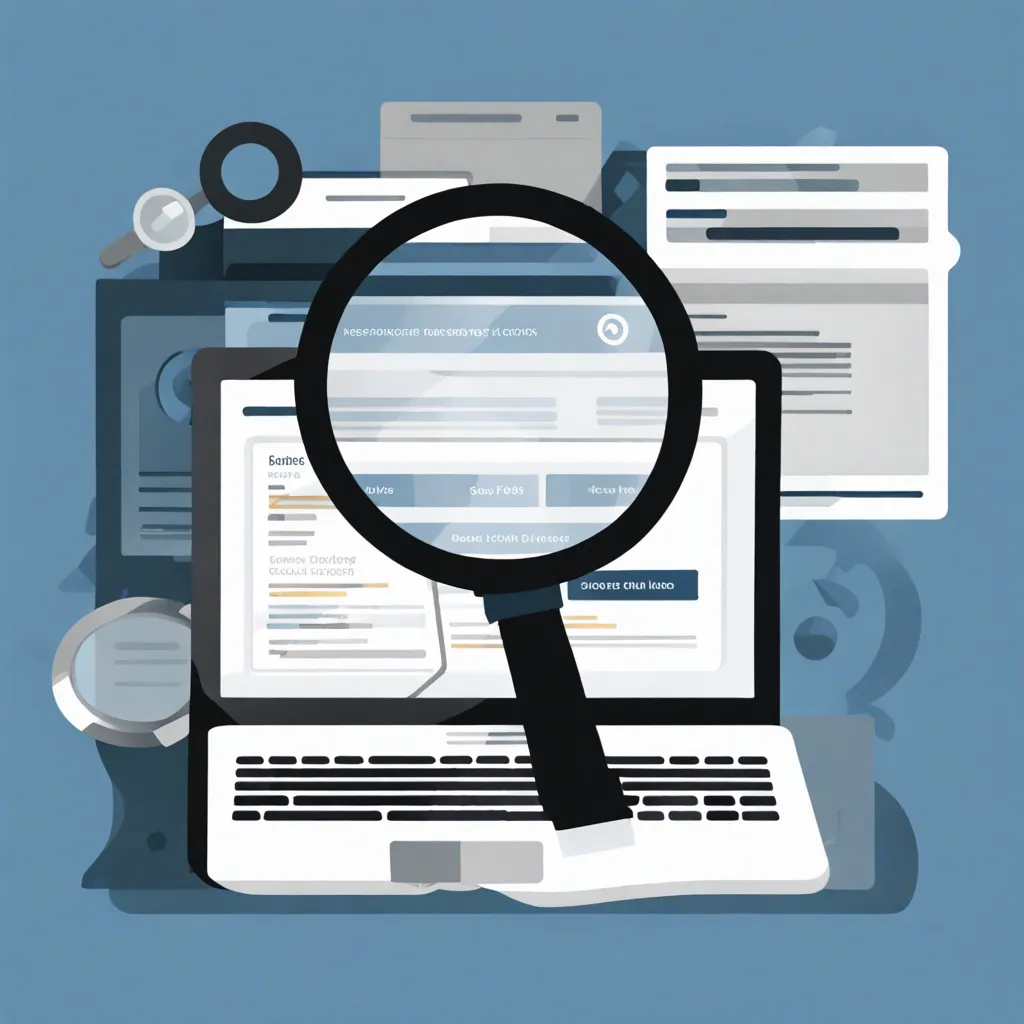

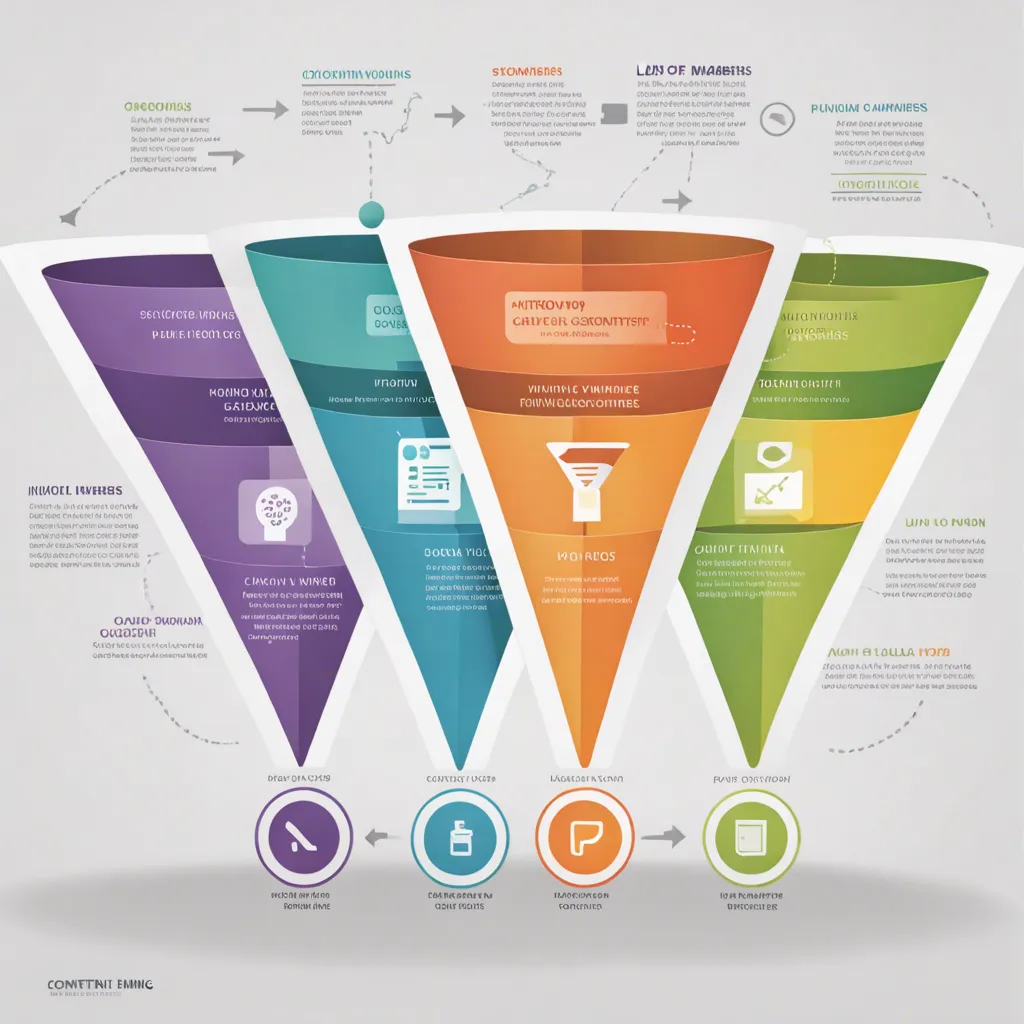
Contents
- 0.1 Key Takeaways
- 0.2 What is Digital Marketing?
- 0.3 Benefits of Digital Marketing
- 0.4 Crafting a Digital Strategy
- 0.5 Role of a Digital Marketer
- 0.6 Essential Skills for Digital Marketers
- 0.7 Tools for Digital Marketers
- 0.8 Major Challenges in Digital Marketing
- 0.9 Types of Digital Marketing
- 0.10 Career Pathways in Digital Marketing
- 0.11 Conclusion
- 0.12 Frequently Asked Questions
- 0.12.1 What is digital marketing?
- 0.12.2 What are the benefits of digital marketing?
- 0.12.3 How do I craft a digital strategy?
- 0.12.4 What is the role of a digital marketer?
- 0.12.5 What essential skills should digital marketers have?
- 0.12.6 What tools are essential for digital marketers?
- 0.12.7 What are the major challenges in digital marketing?
- 1 Services